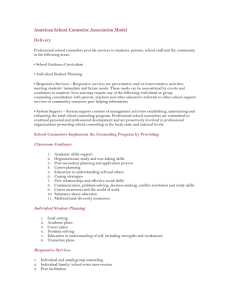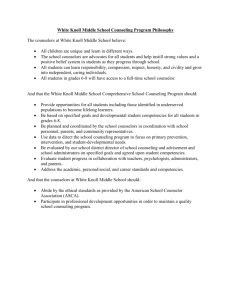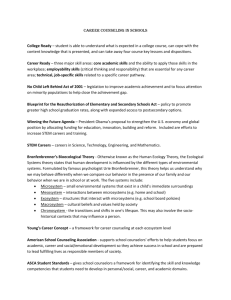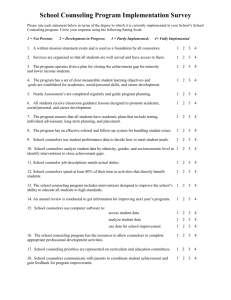to view their RAMP Advisory Council powerpoint presentation to
advertisement
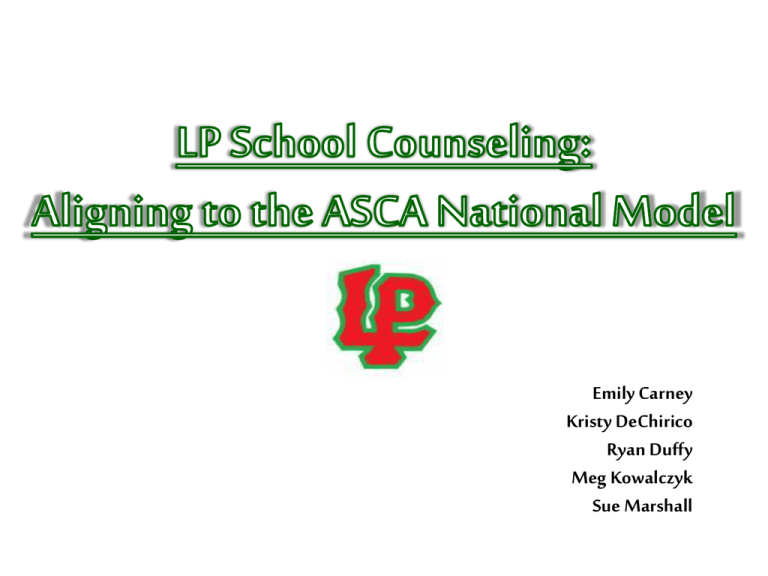
Emily Carney Kristy DeChirico Ryan Duffy Meg Kowalczyk Sue Marshall Defining the ASCA National Model Our Beliefs, Mission, and Vision Counseling Accomplishments Current Counseling Goals Conclusion • What Is ASCA? American School Counselor Association (est. 1952) Endorsed by ISBE • What Is the Model About? Understanding professional practices • Academic, Career, Social/Emotional Auditing current practices (workbook) • • • • Beliefs, Mission, & Vision Cross-walking (9 standards, 16 competencies, 120 Indicators) Time & Task Analysis Continuous data gathering, interpretation, and data-driven goals Taking steps toward alignment • Philosophy/Beliefs: We believe… That all students have a right to a comprehensive school counseling program that helps them to achieve their greatest potential. In a program that is proactive in nature and responsive to the specific needs of its students. The program will be delivered and evaluated annually based on the ASCA National Model, by the counseling department and the Associate Principal of Student Support Services. • Mission Statement: Provide services and curriculum that address the personal/social, academic, and career development of all students. Foster a safe and challenging environment that produces confident, critical thinkers and lifelong learners. • Vision: LP Counselors CARE Career and College Readiness Academic Advising Respect for All Emotional and Social Support • Short-Term Goals and Accomplishments No longer responsible for standardized testing coordination Increased counseling office hours as supervision Created an Annual Counseling Calendar (see handout) Created a Best Practices Manual Created a Crisis Manual Drastically increased small group counseling offerings: • 2014-15: Study Skills (1), Grief (1), and Substance Awareness (4) Increased number of Parent Power Sessions Developed/began offering Developmental Lessons in classrooms classrooms • 2014-15: Depression, prejudice, PTSD, glossophobia, etc. (18) • Short-Term RAMP Goal #1 (see handout) Due to counseling specific programs, the number of freshman classes failed will • • Steps: Increase counseling Study Skills Group offerings Counselors will continue offering “ High School 101 for all freshmen Counselors will revamp and continue offering “PPS: High School 101” Counselors will conduct meetings with parents, teachers, and students as needed Counselors will make phone calls home to parents at 9-weeks each semester Counselors will implement 4- year plans (January, see Goal #3) Measurements: Compare the # failed classes between the Class of 2018 and the Class of 2019 over the entire freshman year Study Skills Group - # and list of students identified for study skills groups vs. # that participate: • # of letters sent home at the 4.5 week mark to parents of students failing 1 or more classes: PPS: HS 101 (# of parent attendees, August 19): HS 101 (students and pre/posttest %s, September 23): Meetings with parents/students/teachers (# of, ongoing): Phone calls (# of phone calls made each 9 weeks, October 16): 4-year plans (see goal/data below) • Short-Term RAMP Goal #2 (see handout) 100% of parents will be contacted by a counselor to better share information appropriate to their student’s grade level • Purpose: Based on 2014-2015 needs assessment results, the following topics were results, the following topics were identified as significant (104-Staff, 115-Parents, • Short-Term RAMP Goal#3 (see handout) The Class of 2019 will create a 4-year education plan by the end of their freshman year, to increase motivation and a successful transition beyond high school • Purpose: Based on the 2014-2015 Needs Assessment results, the following topics were results, the following topics were identified as significant needs (104-Staff, 115-Parents, • Thoughts and feedback • Feel free to email us throughout this process • Please follow our website: – www.lphs.net, click on Academics, click on Counseling • Thank you for your continued support of our division


